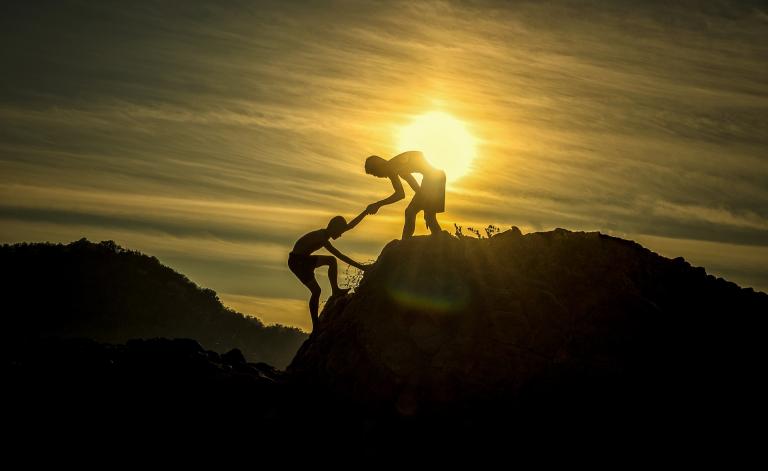In campaigning for greater equality for all, it’s vital that Pagan activists stick up for the rights of the nonreligious as well as the religious.
It’s admirable that so many Pagans are active in the field of human rights. Naturally, many have fought the rights of Pagans themselves – and made significant wins. Thanks to the hard work of both Pagan and non-Pagan activists, Pagans are now less vulnerable to discrimination than before in the US, the UK and other countries.
It’s also admirable that many Pagans also stand up for the rights of others outside the Pagan community. Pagans are frequently advocates of gender and LGBT+ equality. It makes sense; the history of modern Paganism is intertwined with feminist and sexual freedom movements.
There are also Pagans who champion the rights of other religious people too. Many work to challenge religious bigotry against Muslims, Jews and other groups who are frequent victims of hatred and discrimination. And others work in interfaith, helping to build relationships and understanding between different religious communities.
This is all fantastic work and long may it continue. But there is one area where I would love to see more Pagan activists coming forward and speaking up: equality for the nonreligious.
By “nonreligious”, I mean the entire spectrum of people who do not identify with a religion, from those who are ‘spiritual but not religious’, to those who don’t give religion much thought at all, to ‘lapsed’ members of religious communities who no longer practise, to those who actively and proudly identify as Atheist or Humanist.
The nonreligious make up a huge percentage of the world population yet their oppression and persecution are often overlooked, especially in conversations about religious freedom. Religious freedom includes the freedom of non-belief, but this right not to hold a belief is frequently forgotten. Consider:
- In 13 countries, being non-religious is punishable by death.
- In 22 countries, leaving a religion is a criminal offence.
- The overwhelming majority of the 192 United Nation member countries discriminate against citizens who have no belief in a god.
Even in my country, the comparatively liberal UK, the nonreligious are probably the most frequent victims of systemic, legally-sanctioned discrimination than any other religion or belief group. When you consider over 50% of British people have no religion, that’s insane. And yet, when it comes to things even as basic as education, the nonreligious regularly find themselves at a disadvantage compared with the religious.
So here’s why I think Pagan campaigners for equality, inclusivity and human rights should bring their passion and compassion to the cause of championing equality for non-religious people:
#1 Many people don’t think Pagan religions are religions at all.
The first reason why Pagans should champion rights for the nonreligious is self-interest. In many people’s minds, Pagans are included in the nonreligious group because they think Paganism ‘isn’t a proper religion.’ It’s true that Paganism does look pretty different from the ‘mainstream’ religions: there’s no formal clergy, no firmly established rules, no holy book, no centralised organisation, and very few official places of worship. To many, this is reason enough for Paganism to not be considered a religion (or group of religions, to be more accurate).
This is even an issue in some legal jurisdictions. In England, the state’s charity regulator failed to recognise the Pagan Federation, one the largest organisations supporting Pagans in the UK, as a religious organisation for the purposes of charity law. This is simply because Paganism looks a little different to religions such as Christianity, Buddhism, Jainism, Hinduism and other religions readily recognised as such in charity law.
There are even Pagans who don’t consider Paganism a religion. For some, the word ‘religion’ has negative connotations of control and dogma, and so they do not like to associate Paganism with the term.
As long as the notion that Paganism isn’t a ‘real’ religion is widespread, it makes sense for Pagans to ensure the rights of the nonreligious are given equal protection to those of the religious, in order to protect themselves.
#2 The links between Paganism and Atheism are deep
On one level, it’s understandable that so many people fail to recognise Pagan beliefs as religions: the average Pagan and the average Atheist has a lot in common.
Both Pagans and Atheists usually reject dogma in favour of freedom of thought and expression. Both rebel against authoritarian religions. Both tend to value the concept of universal human rights for the individual over obedience to religious authorities. Both usually have at least an appreciation for science and environmentalism. And both have long been despised by fundamentalists and theocracies, and there’s still often a stigma attached to the labels “pagan” and “atheist”. Any time either a Pagan or an Atheist tries to assert their human rights, you’ll find there are religious groups who, sensing that their privilege position is threatened, do their utmost to accuse them of militancy or religious intolerance.
In the minds of many fundamentalists, the terms “pagan” and “atheist” are more or less interchangeable. One historical use of the term “pagan” was simply someone who was not a Christian, or rejected Christian teachings. That could be someone who follows a nature-based, polytheistic path, or someone who follows no religion at all.
The connection between Paganism and Atheism is so strong that there are no shortage of people who identify as both “Pagan” and “Atheist”, or “Witch” and “Atheist”. There are secular witches, who practice magic without believing in any gods; they see themselves as the source of their magic without the need of any spirits of deities. And there the flourishing Humanistic Pagan, Atheopagan and Pantheist movements, all of which vary but are linked by a rejection of superstition and traditional notions of deities.
While they may not see eye to eye on everything, most Pagans and Atheists have enough in common to make natural allies in the battle for equality and human rights for all.
#3 Nonreligious rights = human rights
The most important reason why Pagans should support equality for the nonreligious is because nonreligious rights are human rights. That’s the one thing that links us all, regardless of race, gender, nationality or religion/belief: we are all human. Nonreligious people are just as worthy of respect, dignity and the right to hold beliefs as religious people. Those who believe in universal human rights have moral obligation to recognise and uphold this.
So the next time you’re out fighting for the rights of Pagans and other religious groups, please consider whether your efforts are equally supportive and inclusive of the rights of the nonreligious. In your fight stop children from Pagan families from being discriminated against in education, are you also helping children from nonreligious families? In your fight for the right of minority religious groups to live without discrimination, are you also supporting the right of members who have left, or want to leave the religion, to live without intimidation or shame? In your local interfaith group, are nonreligious people who support the aims of interfaith given an equal right to participate?
Champion the rights of the nonreligious for the same reasons you champion the rights of the religious – because to do so is to champion the rights of Pagans, and the rights of all human beings.

















